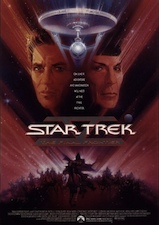 Bruce Campbell practically defines what it means to be a B-movie star. Â His CV includes some of the best low-budget material of all time, and even to this day his iconic portrayal of Ash in Sam Raimi’s Evil Dead trilogy is one of the best cheesy horror movie performances you can find. Â Maybe it’s his deadpan seriousness, or his masterful delivery of tongue-in-cheek ironic comedy, or maybe it’s all about the chin. Â But whatever it is about Mr. Campbell, he has one of the most loyal and devoted fanbases of any Hollywood star, and is perfectly suited for a movie about a geriatric Elvis impersonator battling a reincarnated Egyptian mummy for control of his eternal soul.
Bruce Campbell practically defines what it means to be a B-movie star. Â His CV includes some of the best low-budget material of all time, and even to this day his iconic portrayal of Ash in Sam Raimi’s Evil Dead trilogy is one of the best cheesy horror movie performances you can find. Â Maybe it’s his deadpan seriousness, or his masterful delivery of tongue-in-cheek ironic comedy, or maybe it’s all about the chin. Â But whatever it is about Mr. Campbell, he has one of the most loyal and devoted fanbases of any Hollywood star, and is perfectly suited for a movie about a geriatric Elvis impersonator battling a reincarnated Egyptian mummy for control of his eternal soul.
Well, maybe not an Elvis impersonator. Â Campbell’s character Sebastian Haff could very well be Elvis for all we know. Â As Haff tells it, the King himself was tired of living the life of a rich and famous rock star, so he switched places with the best Elvis impersonator he could find. Â When Haff kicked the bucket in 1977, the world assumed it was the real Elvis, which left the true real Elvis still alive.
It’s this kind of quirky logic that keeps Bubba Ho-Tep firing on all cylinders throughout its 90-minute run time. Â Campbell plays Elvis to the hilt, giving us an utterly believable portrayal while delivering lines like “Your soul suckin’ days are over, amigo!” with such conviction that one can’t help but root for the guy. Â Perfectly complementing Campbell’s grumpy Elvis is Ossie Davis, one of Elvis’ friends at the nursing home who is convinced he is JFK. Â Yeah, I know. Â Trust me, it all makes sense when you watch the movie.
The plot seems so terrible at first glance that it’s easy to dismiss the movie outright. Â Even the idea of spending an evening watching two grumpy old men fight a reincarnated mummy king is enough to make me want to go fetch my high school calculus textbook for a bit of escapism. Â But it’s the heart and soul that Campbell and Davis bring the movie, not to mention whip-smart direction by Don Coscarelli and dialog so funny it had me nearly shooting rice krispies out my nose, that makes Bubba Ho-Tep shine. Â And for all its strangeness, there is a heartfelt sincerity at work here as these two men with virtually nothing left to live for find a strange sense of purpose and fulfillment in going head to head with an evil reincarnated mummy king.
The special effects are as cheesy as they come, the groan-inducing dialog is razor-sharp and eminently quotable, and the acting is as good as B-grade films can possibly hope for. Bubba Ho-Tep is the kind of movie that is perfectly suited for Bruce Campbell, and it was a pleasant surprise that caught me off guard but lured me in right away with its pitch-perfect blend of dark humor and genuine emotion.
Rating:[Rating:4/5]



















